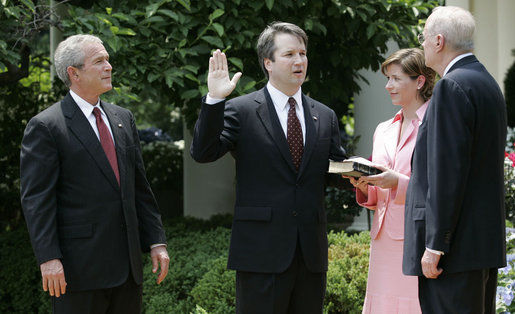- App Content
- App Content / News
- News
- News / Politics And Administration
- News / Politics And Administration / City
New supreme court nominee ‘could change past and future rulings,’ says Iowa State political science professor

President George W. Bush Attends Swearing-In Ceremony for Brett Kavanaugh to the U.S. Court of Appeals for the District of Columbia Circuit, June 1, 2006, in the Rose Garden.
July 18, 2018
The nomination of Judge Brett Kavanaugh to the supreme court could “change a lot of past and future rulings,” said one Iowa State political science assistant professor.
Kavanaugh, a District Court judge in Washington D.C., was nominated by President Donald Trump on Monday, July 9. He was chosen over three other front-runners, Judges Amy Coney Barrett, Thomas Hardiman and Raymond Kethledge.
David Andersen, assistant professor of political science, said Kavanaugh will likely be approved which means the Supreme Court, which has had a conservative majority for the last 40 years, would have a larger conservative lean.
“The swing vote on the court has typically been a lukewarm conservative,” Andersen said. “With Kavanaugh, the swing vote would become very conservative, which could change a lot of past and future rulings.”
Andersen said, rulings like Roe v. Wade, which forbids states from outlawing abortion, could be thrown out with a more conservative panel. Andersen said Kavanaugh could also loosen gun laws and make gun free zones a federal matter.
“The university shouldn’t be affected very much by Kavanaugh because Iowa State doesn’t deal with the federal government outside of grants,” Andersen said.
Kavanaugh’s nomination came with mixed support. Many Republicans support the nomination and are optimistic about Kavanaugh’s chances.
“Judge Kavanaugh is one of the most qualified Supreme Court nominees to come before the Senate,” said Sen. Chuck Grassley, R-Iowa, who is the chairman of the Senate Judiciary Committee, in a statement on his website.
On the other side, Democrats are mainly undecided or opposed. Among the opposition is Sen. Tammy Baldwin, D-Wisconsin.
“The people of Wisconsin need a fair, impartial and independent Supreme Court justice who will stand up for them, not for powerful special interests,” said Baldwin, in a Facebook statement. “I don’t have confidence that Judge Kavanaugh would be that justice.”
Sen. Catherine Cortez Masto, D-Nevada, said the next nomination would “hold immense power.”
“President Trump’s nominee for the Supreme Court will hold immense power over the most critical issues facing our nation,” Cortez Masto said.
She did not, however, outwardly say she opposed Kavanaugh.
“We need a Justice who respects the rights and freedoms enshrined in our Constitution, not someone who is beholden to special interest groups,” Cortez Masto said. “I plan to meet with Judge Kavanaugh in the coming months and will review his qualifications thoroughly.”
Andersen echoed some of Cortez Masto’s sentiments regarding where Kavanaugh’s priorities lie, saying Kavanaugh is likely to prioritize business rights before consumer rights, which is something Andersen said many people don’t realize he can affect.
Democrats like Cortez Masto will be key for Kavanaugh should his nomination reach the Senate, as they could be the swing votes in a Senate with a very slim 51-49 Republican majority.
Before he reaches most of these senators though, he must undergo a thorough review of his political and legal stances with the Senate Judiciary Committee.
Should the Senate Judiciary Committee vote him through to the Senate, then all 100 senators may speak and debate on Kavanaugh’s nomination and ability to be a justice of the Supreme Court.
If the Senate approves of Kavanaugh, then he will take an oath to become a justice. If at any vote a simple majority of the voters are against his nomination, then he will be rejected and the President Trump will have to choose a new candidate.
Though no vote has been scheduled, Senate Majority Whip John Cornyn, R-Texas, told Politico the confirmation vote may happen in September. Until then, Kavanaugh will continue to meet with senators and make his case to become the newest Supreme Court justice.















